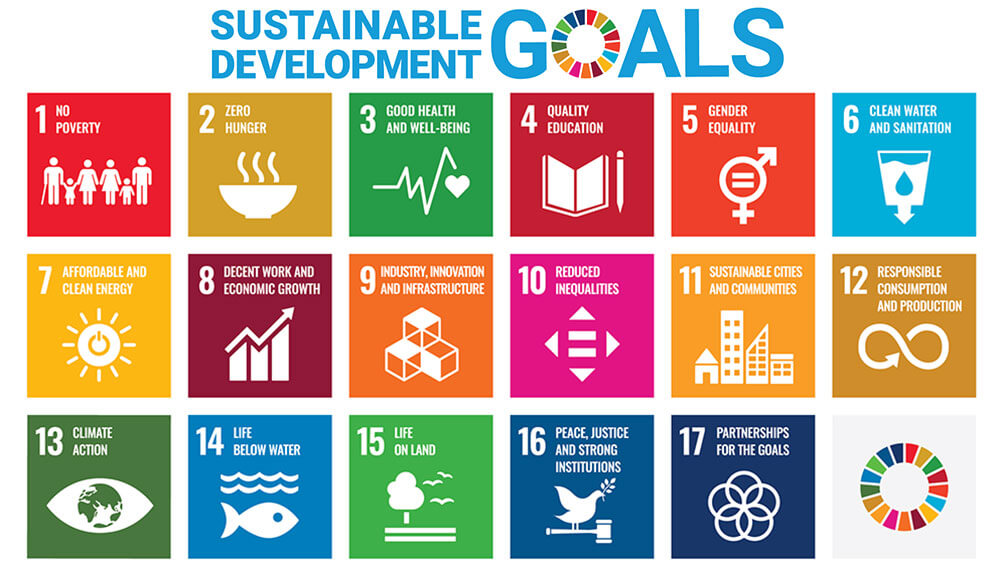
Event organizers are embracing the United Nations’ 17 Sustainable Development Goals. The goals featured individually throughout this story are the ones that planners most often mention when surveyed. (Courtesy UN)
1.5 degrees Celsius. It doesn’t sound like much, but if global warming rises by more than 1.5 degrees (2.7 degrees Fahrenheit), the Earth will pass a perilous threshold, leading to increased risks of droughts, flooding, extreme heat, higher sea levels, and massive declines in coral reefs. And it could happen by 2040, according to the United Nations’ Intergovernmental Panel on Climate Change.
That was the disturbing message that Miguel Naranjo, program officer with the UN’s Climate Change Secretariat, brought to attendees at IMEX America in September 2019. “Sustainable events,” Naranjo said during a press conference at the Las Vegas–based show, “are the only way to ensure that this business will continue to exist.”
The events industry is paying attention. At IMEX, Naranjo announced the creation of the Events Industry Council’s (EIC) Centre for Sustainable Events, to provide education and resources for meeting planners, and to align the meetings industry with the UN’s Sustainable Development Goals (SDGs). Adopted by UN member states in 2015, the 17 SDGs represent a kind of planetary to-do list — they encompass an ambitious array of goals, ranging from fighting climate change to ending poverty to reducing gender inequality, with a deadline of 2030.
As part of the launch, EIC released a set of updated EIC Sustainable Event Standards, the scope of which extend beyond environmental sustainability to include issues that mirror the SDGs and are related to the business events industry — including accessibility, diversity and inclusion, and social justice. Formerly the APEX/ASTM Environmentally Sustainable Meeting Standards, they were redesigned with the participation of 100 leading meetings professionals from 15 countries.
In the future, “I hope that the conversation is less around one element of sustainability, and more around the interconnectedness of these principles,” said EIC CEO Amy Calvert. “Events are not just about the logistics — or even the meeting experience. It’s about their transformational capability to leave a lasting impact on the communities we serve.”
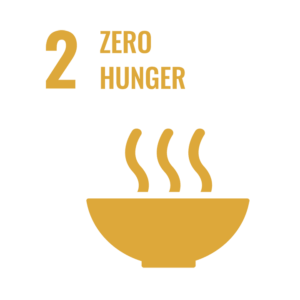
End hunger, achieve food security and improved nutrition and promote sustainable agriculture. Event planners donate uneaten food, reduce waste, and choose locally grown food.
Lining Up With the SDGS
By linking their objectives more closely to the UN’s SDGs, the EIC has joined a groundswell of global organizations that use the Sustainable Development Goals as a framework for their own initiatives. In 2018, when the global sustainable business nonprofit BSR surveyed its 152 members — Microsoft, LinkedIn, Samsung Electronics, and American Express, among them — 71 percent reported that that they were using the UN’s SDGs to guide their sustainability efforts. Last year, nearly half — 48 percent — said that they were using the SDGs to set corporate performance targets, compared to less than 20 percent three years earlier.
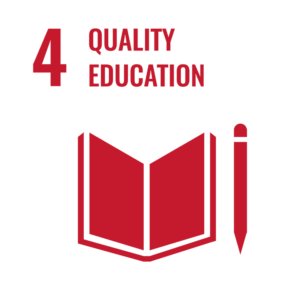
Ensure inclusive and equitable quality education and promote lifelong learning opportunities for all. Event planners can provide access to young people and broaden access to other groups through scholarship programs and other opportunities.
The SDGs have a lower profile in the meetings industry. A 2019 sustainability survey conducted by the International Association of Venue Managers (IAVM), for example, found that only 20 percent of participants included the SDGs in their sustainability strategies, and that 52 percent were not aware that the SDGs existed. But there are strong signals that the industry is moving quickly on making sustainability a priority. Seventy-six percent of venues are engaged in more sustainable practices than they were three years ago, according to the IAVM study. And the 2019 International Association of Conference Centres’ (IACC) “Meeting Room of the Future” report found that ethical and sustainable practices ranked number two in survey participants’ list of the most important meeting elements.
“This is a significant trend,” the report’s authors noted, “Meeting planners are conscious of their environmental and social footprint and want to reduce their impact moving forward.”
 Subscribe to Convene.
Subscribe to Convene.
Want deep-dive insights on events delivered to your inbox? Sign up for our newsletters.
Last summer, the U.K.-based Positive Impact Events produced the first-ever SDG survey tailored to the events industry, which asks meeting professionals to rank the importance of the UN’s 17 SDGs and commit to taking action. According to early results — by August 2019, approximately 7,000 event professionals from 58 countries had participated in the survey — event professionals had pledged most often to act on three of the goals: SDG 2, zero hunger; SDG 6, clean water and sanitation; and SDG 13, climate action. But notably, planners expressed both the commitment and desire to act on each of the 17 SDGs (See Event Planners Rank the Goals).
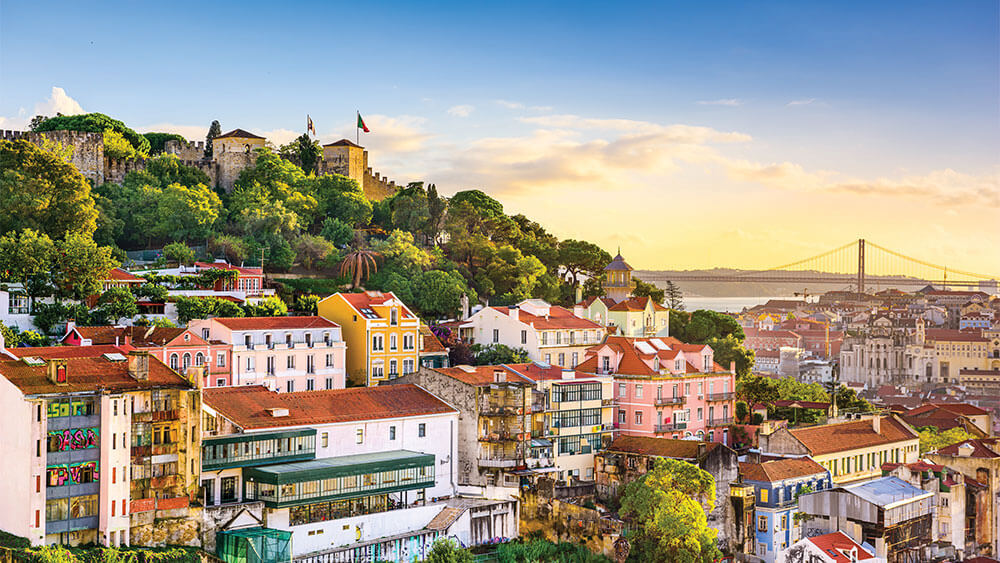
Lisbon, Portugal, won the European Green Capital Award for 2020, an initiative of the European Commission, which noted that Lisbon “can be an inspiration and a role model for many cities across the EU, demonstrating clearly that sustainability and economic growth go hand in hand.”
Goals of the Goals
One of the challenges in talking about sustainability is that it doesn’t mean the same thing to everybody. When Mercedes Hunt, the founder and owner of Map & Compass Consulting, was conducting research for the 2019 IAVM report, she asked convention center employees how they defined sustainability — and each person gave her a different answer, she said. “Many people say, ‘It’s recycling,’” she said, “and they forget that it’s a lot more complex.”
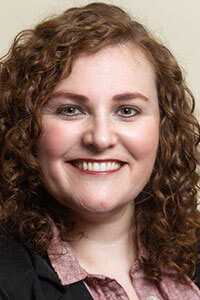
Mercedes Hunt
Hunt’s own definition of sustainability — “It’s about the social-cultural well-being of people” — is in line with the SDG goals, which Hunt considers a “a good starting point” for organizations that want to boost their sustainability efforts. Reviewing the SDGs can help you ask yourself questions about your event, Hunt said, including: Does our conference lineup include both men and women? Is there cultural diversity? along with environ- mentally focused questions, such as, “Can we donate used materials afterwards?” When Hunt works with organizations, she asks them: “What is your mission, vision, and values, and how do they align with the SDGs?” she said. “How can you capitalize on things that you’re already doing? And who is impacted by the event? Because anyone who is impacted is a stakeholder.”
As a principal at Honeycomb Strategies, sustainable event consultant Amanda Simons lives and breathes accountability. The consultant firm specializes in certification frameworks, including the EIC’s Sustainable Event Standards and ISO 20121, a voluntary standard created by the International Organization for Standardization. Those frameworks are data-driven, with precise requirements for tracking and measuring. Certifications are important, Simons said. But the standards also can be inflexible and create a lot of confusion and undue stress, she added. “What I like about the SDG goals is that they are not prescriptive. They are not another checklist.”

Amanda Simons
The SDG framework allows event organizers to work toward goals including climate action and creating a positive impact on destinations, even if they can’t reach the goals required by certifications, she said. Event organizers can pick the goals that are most relevant to them, and start working on them right away, Simons said. Steady, incremental changes, can “have long-lasting effects,” she added.
“I think the interesting thing about the goals is that they give us a common goal to work towards and framework to keep it consistent,” Simons said. “There are no hard-and-fast rules here, but for each event, there are always actions and efforts that take place that support one — and oftentimes many more — of the 17 goals.”
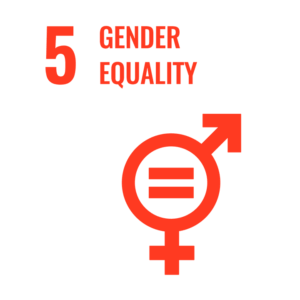
Achieve gender equality and empower all women and girls. Event planners can create anti-discrimination policies for events and ensure that at least 50 percent of content is provided by women.
Because the goals are not prescriptive, they leave room for organizations to focus on the ones that are most relevant to their events and to reach for solutions that aren’t easily checked off in a list. For example, one of Honeycomb Strategies’ clients, the Specialty Coffee Association (SCA), has been working to create a more sustainable way for attendees to sample exhibitors’ products at events, including their Specialty Coffee Expo. “At a tasting show, if everybody is giving little cups out, that’s a lot of disposable cups,” Simons noted. Their solution: Provide attendees with a “rental cup” — available for a small deposit that is refunded when the cup is returned. One of the challenges, Simons said, was to come up with a design that attendees would want to use, but that wasn’t so nice that people would want to take them home.
The SDGs also give associations and organizations the opportunity to bring their own particular professional expertise to global sustainability challenges. The American Psychological Association (APA) already has a track record of focusing on environmental sustainability at its meetings, but last November, APA CEO Arthur C. Evans Jr. joined the leaders of psychological associations from 43 countries in Lisbon for the first-ever International Summit on Psychology and Global Health.
The summit focused on how psychology can contribute to SDG 13, which pledges to “take urgent action to combat climate change and its impacts.” Evans and others agreed to jointly advance progress on critical global issues, including the UN’s SDGs. “Climate change is a problem created largely by human behavior,” Evans said at the summit, “so it is fitting that we apply the science of human behavior to mitigating its impacts.”
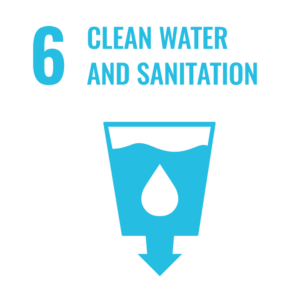
Ensure availability and sustainable management of water and sanitation for all. Event planners can provide accessible water drinking stations and choose venues with water-saving initiatives.
Progress Reports
Along with an increased emphasis on sustainability as a business strategy, sustainability reporting is on the rise around the globe. In 2018, 86 percent of companies listed in the S&P Fortune 500 created sustainability reports, according to the Governance and Accountability Institute, a New York City–based business management consultancy.
Such reporting is a growing trend within the meetings industry, as well as with meeting organizers, hotel companies, catering companies, and venues, including convention centers that are issuing annual sustainability reports for the first time. And some are using the UN SDGs to help frame their initiatives and impact.
Oracle, the software company, has been measuring the impact of its largest event, OpenWorld, for more than a decade, beginning in 2009. In recent years, the company has begun linking its sustainability efforts to the SDGs and highlighting them in an Event Sustainability Report. In 2018, Oracle reported on progress toward six of the SDG goals at the OpenWorld event held in San Francisco, including: zero hunger (Oracle OpenWorld donated 1,481 pounds of food); good health and well-being (61 percent of the menu was locally sourced); quality education (the conference offered 2,371 education sessions); decent work and economic growth (the event had a $195-million economic impact); climate action (Oracle Open-World has offset more than 110 million pounds of carbon since 2011); and partnerships (the conference featured speakers from more than 93 countries). In 2019, the report linked the conference sustainability efforts to eight of the SDGs.
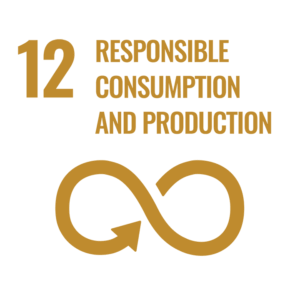
Ensure sustainable production and consumption patterns. Event planners can report on their events’ sustainability; provide access to bins to separate food waste, glass, paper, and metal, etc., and reduce, reuse, and recycle where possible.
In 2018, MGM Resorts International, an EIC Centre for Sustainable Events partner, aligned its social impact and sustainability strategy with 10 of the UN SDGs. Its food donations program, Feeding Forward, supports SDG 2 — zero hunger — and “helps us embrace humanity by serving the food insecure in our community and protect the planet by reducing food waste,” Yalmaz Siddiqui, vice president of corporate sustainability, told Convene via email. MGM Resorts International has donated more than 1.5 million meals over the past three years and has diverted more than 200,000 tons of food from landfills by sending scraps to farms to feed animals, converting grease to biofuels, and sending oyster shells back to oceans to replenish ecosystems. And in 2021, the company will break ground on a 100MW solar array with 300,000-plus panels, which will generate more than 90 percent of daytime electricity needs for the company’s Las Vegas resorts — more than 70 million square feet of buildings, according to Siddiqui.
Last December, the company announced that it had created social impact and sustainability goals for 2025 that encompass all 17 of the SDGs, including spending at least 10 percent of the company’s procurement funds on diverse suppliers, ensuring equal access to leader opportunities throughout the company, reducing carbon emissions per square foot by 45 percent, and providing 5 million meals through a program that donates unserved food.
RELATED: What Planners Can Do to Make Events More Sustainable
The organizers of Dreamforce 2019, an annual conference hosted by the cloud-based software company Salesforce, used its 170,000-person meeting as an opportunity to not only support the SDGs but to educate attendees about their aims and importance. Attendees could take a quiz that identified which one of the SDG goals most represented their values; they were then directed to event sessions and activities based on those goals. For example, participants could visit a kids’ coding camp to support public education (SDG 4) or sign up for a speed-networking session with local young adults at a “Future Executive Summit” (SDG 8). The event also included an attendee scavenger hunt with the goal of unlocking $1 million to be donated to organizations focused on advancing the SDGs.
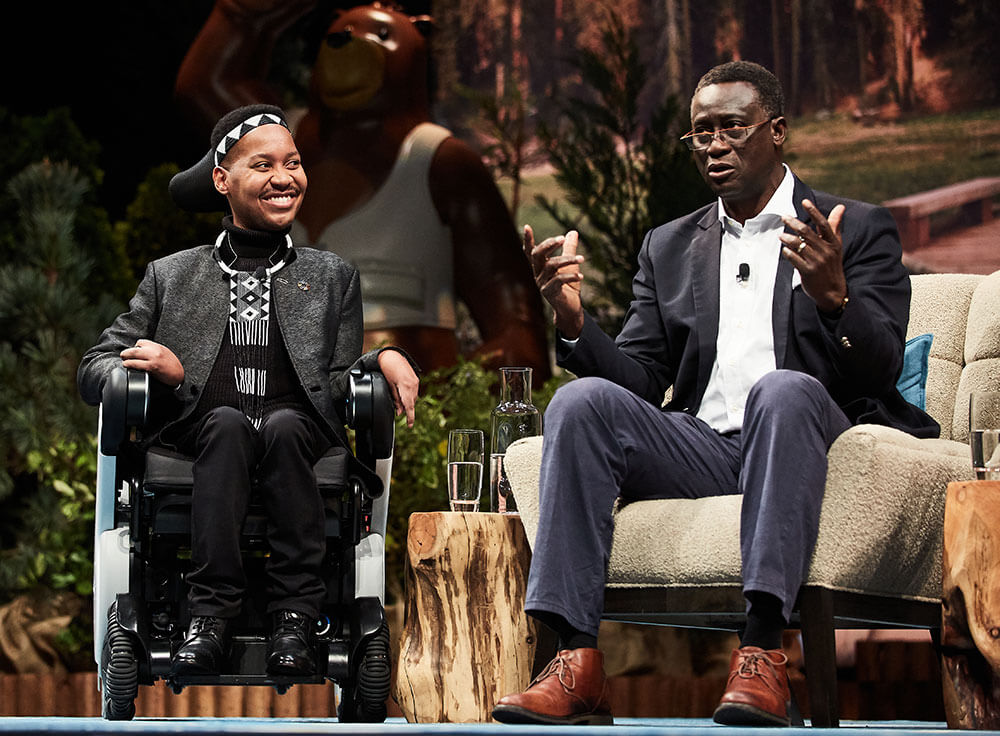
Activist Eddie Ndopu (left), a UN Global Advocate for the Sustainable Development Goals, talks with Carlos Madjri Sanvee, secretary general for World YMCA, about the role of trust in achieving the goals Salesforce’s Dreamforce 2019 conference. (Courtesy Salesforce)
Looking Ahead
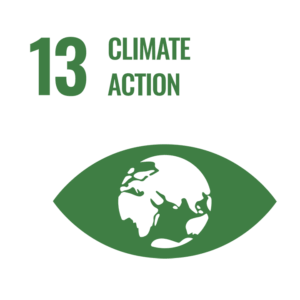
Take urgent action to combat climate change and its impacts. Event planners can provide incentives for event attendees to use public transport and serve plant-based menus at events.
As the need for climate change action becomes more urgent, so will expectations about sustainability — particularly among younger attendees. In a 2019 Edelman poll, U.S. millennials and members of Generation Z named climate action, poverty, and hunger — all SDG action items — as the world’s most pressing issues. In the 2019 IACC report, 44 percent of respondents said that ethical operations and sustainable practices will be one of the most important elements for venues by 2024.
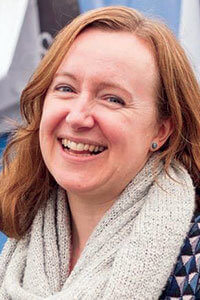
Fiona Pelham
“The pace of change has intensified since activists like Greta Thunberg have taken sustainability and the climate crisis out of the hands of politicians,” IACC CEO Mark Cooper told Convene by email. “Event buyers are looking for smart, forward-thinking destinations and venues that can meet their requirements; for venues that can showcase exciting, local, fresh foods; and for suppliers that understand their commitment to recycling, energy emissions, water usage and waste, and who champion and provide high-tech innovation. These are no longer add-ons, but requirements to stay in the game.”
Fiona Pelham, CEO of Positive Impact Events, which conducts the survey on SDGs and event organizers, said the goal that best matches the events industry is actually SDG 4: quality education. One of its subordinate goals is to ensure that “all learners acquire knowledge and skills needed to promote sustainable development.”
“The event industry really educates everybody,” Pelham said. “So that target may be most important to the event industry, because it’s reframing the narrative of what business events are about. If every politician and CEO understood the need to reach [the target] more events would be needed — and that would be great for our industry. But as an industry, we haven’t 100 percent said, ‘Hey, we’re linked to this goal.’
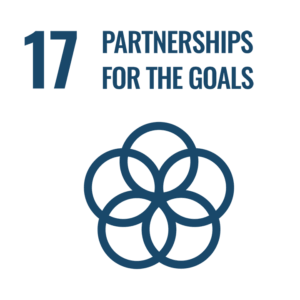
Strengthen the means of implementation and revitalize the global partnership for sustainable development. Event planners can share best practices and choose suppliers who report on sustainability initiatives. They also can collaborate with local communities to understand their event’s impact.
“Five years from now, I think we’ll have to be working in a culture where sustainability is considered in every decision point, where the supply chain is saying, this is the cost, this is the positive impact and negative impact you’re having, and where you’re reporting on the impact of every event,” Pelham said. “Across the whole supply chain, we need to get better about understanding the carbon footprint of everything we do.”
The future of the industry could beat stake. Last year, Pelham participated in a Global Meetings Industry Day webinar with three young climate-change protestors. One 12-year-old said he would never fly to a conference. “I couldn’t put my job before the planet,” he said. At another event, an attendee said his eight-year-old daughter cried when she learned he was flying there.
“I think that we have about five years to position ourselves as the main strategic tool for human collaboration, and if we don’t do that, we’re going to be cast aside, because there will be lots of regulations or scary stories around the negative impacts of events,” Pelham said. “We as an industry will need to tell our story more, about why it’s important to bring people face to face for a live experience, because it’s going to become easier to have virtual reality attendance at a conference.”
Yet the upsides of meeting, she believes, still far outweigh the downsides. “When we bring people together, humanity changes. And that has more of an impact than the waste we create.
Ken Budd is the author of The Voluntourist and the host of 650,000 Hours, a web series and podcast on travel and giving back that will debut this year. Barbara Palmer is deputy editor at Convene.
Earn One Hour of CE Credit
By reading this story and related stories below and at the links above, you will be ready to earn one hour of CE credit toward CMP certification from the Events Industry Council. To take an online test to earn that CE credit, and for access to additional CMP Series stories, go to PCMA’s Convene CMP Series page.
- MeetGreen’s “Straight Talk about SDGs”
- IMEX Group’s “How Individual Wishes Become Collective Goals: Sustainability in the Events Industry”
- Centre for Sustainable Events’ “Four Principles for Sustainable Events”
The Certified Meeting Professional (CMP) is a registered trademark of the Events Industry Council.
